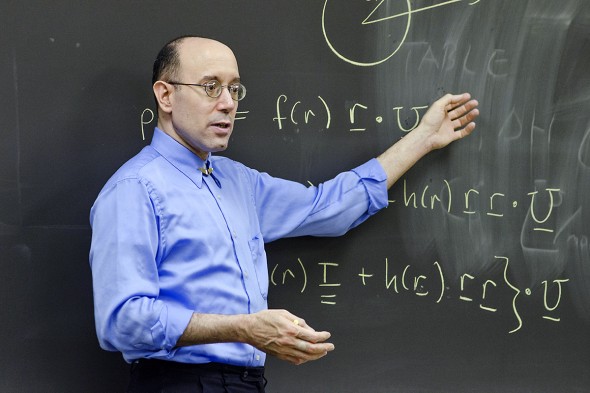Math is fun, like making your own Legos

“Ultimately, people don’t go higher than their aspirations. I think it’s better to try for something and not make it, than not to have tried,” says Ludwig Nitsche, associate professor of chemical engineering. “I will be there rooting for you.” Photo: Joshua Clark/UIC Photo Services
Each year, UIC honors some of its most dedicated and outstanding teachers with the Award for Excellence in Teaching. The winners, who receive a $5,000 salary increase, are selected by past recipients.
Ludwig Nitsche has high expectations for his students — because he knows they can accomplish more than they might expect.
“Ultimately, people don’t go higher than their aspirations,” says Nitsche, associate professor of chemical engineering. “I think it’s better to try for something and not make it, than not to have tried.”
But setting high expectations also means teachers must make time to help students work through challenges, Nitsche says.
“It’s important that the education you get in this department is at the same level as what you get at MIT or Stanford, and sometimes that means asking students to do things they initially think they can’t do,” he says.
“But you can’t just set expectations and that’s it — you have to be there for them, spending time helping them.”
Nitsche joined the chemical engineering department in 1991 after completing a postdoctoral fellowship in fluid mechanics at the University of Cambridge.
“This department is a friendly place and I really like and appreciate our diverse student body,” he says. “The students keep you on your toes.”
Nitsche emphasizes the mathematics behind the engineering concepts in the courses he teaches to his undergraduate and graduate students.
“Every law of physics is phrased in terms of a differential equation,” he says. “To speak and respond to what’s going on, you need to know the math.”
The best way to get students interested in a topic? Express your own enthusiasm for the ideas you’re presenting, Nitsche says.
“I want to recast math as a lot of fun and an emotional experience: really expressing yourself,” he says.
“The way I feel about computation is an adult version of what it felt like when I was a kid playing with my Legos — and you couldn’t pry me away from my Legos. With numerical computation your ‘Legos’ are abstract constructs, and — best of all — you get to make your own bricks to build whatever is needed to solve the problem at hand.”
His own research focuses on computer simulations of fluid mechanics, with applications in drop dynamics, porous systems and membrane separations, like desalination of seawater.
“In research I live in kind of a virtual world,” he says. “I do computer simulations that model the physical world. These simulations use methods in which particles communicate and interact with each other.
“You turn loose a swarm of particles and give them specific rules of interaction. Each particle by itself is not very smart but 100,000 particles moving together, they are very smart,” he says, “and can solve some complicated problems in fluid flow and mass transfer.
Nitsche is the principal investigator of a $600,000 NSF S-STEM grant to provide scholarships for undergraduates in chemical engineering, emphasizing career interests that social science research has shown to be particularly appealing to female students.
Since recruiting for the ChemE Scholars program began in fall 2011, the annual number of chemical engineering applications has risen from 125 to 247, including a 50 percent increase in female applicants.
“There was a time when you could work your way through school, but that just doesn’t work anymore,” he says. “We want to bridge the gap between being accepted at UIC chemical engineering and enrolling, and it’s very often a financial issue.”
In his spare time, Nitsche enjoys ballroom dancing, a hobby he took up 16 years ago.
“What it’s ultimately about is mastery,” he says. “I really just admire the dedication and technique of people who have truly mastered something and can make it understandable and pass it along. In my own sphere of expertise, that’s what I try to do in teaching.
“What people value, what you can make a contribution to society with — and what employers will pay high salaries for — is a deep set of skills, which aren’t going to come quickly or easily. It’s about years and years of practice and patient application.”
To get his students motivated, Nitsche usually greets students on the first day of class with a quote from “The Matrix,” his favorite film:
“I can only show you the door, Neo. You’re the one that has to walk through it.”
Homework and studying is walking through the door, he says.
“Only you can do it,” he says. “But I will be there rooting for you.”
